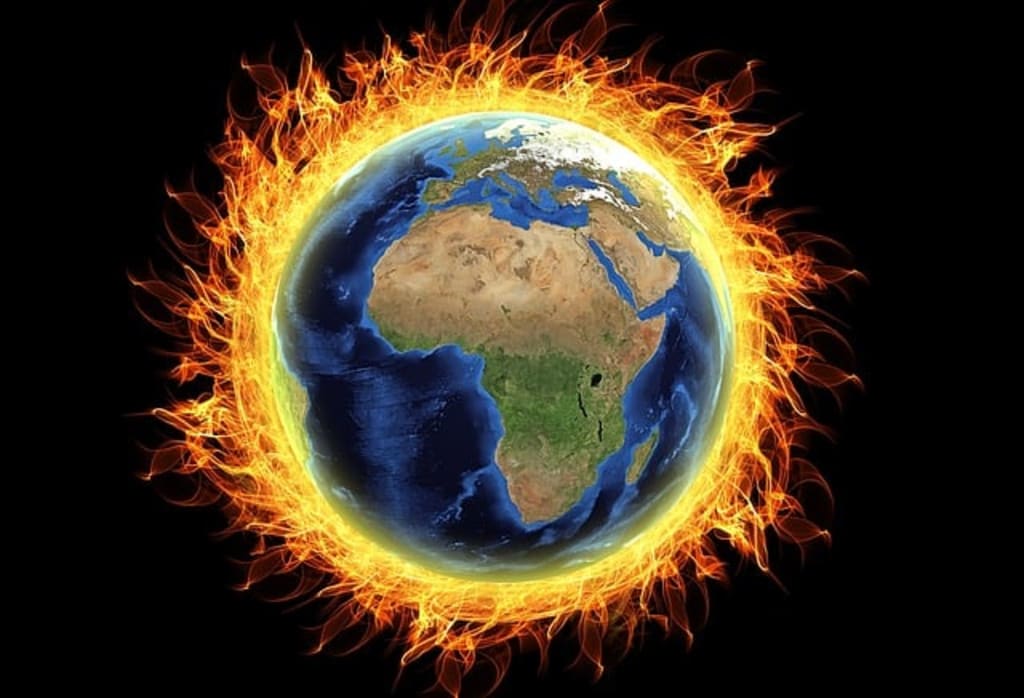Title: Global Warming: A Call to Action for a Sustainable Future
Global Warming

Introduction
Global warming, also known as climate change, is an escalating crisis that poses significant challenges to the planet and its inhabitants. As human activities continue to release greenhouse gases into the atmosphere, the Earth's temperature rises, leading to adverse effects on ecosystems, weather patterns, and human well-being. In this article, we will delve into the causes and consequences of global warming, while emphasizing the urgent need for collective action to mitigate its impacts and build a sustainable future.
The Causes of Global Warming
The primary cause of global warming is the excessive accumulation of greenhouse gases, such as carbon dioxide (CO2), methane (CH4), and nitrous oxide (N2O), in the Earth's atmosphere. Human activities, including the burning of fossil fuels for energy, deforestation, industrial processes, and agriculture, significantly contribute to the emission of these gases. These emissions trap heat within the atmosphere, leading to the greenhouse effect and the subsequent rise in global temperatures.
The Consequences of Global Warming
Global warming has far-reaching consequences that affect various aspects of our planet. Rising temperatures lead to the melting of polar ice caps and glaciers, resulting in rising sea levels and increased coastal flooding. Extreme weather events, including hurricanes, droughts, and heatwaves, become more frequent and severe, impacting agriculture, water resources, and human settlements. Changes in precipitation patterns disrupt ecosystems, leading to habitat loss and biodiversity decline. Additionally, global warming exacerbates health issues, such as heat-related illnesses, respiratory problems, and the spread of diseases.
Mitigation Strategies and Sustainable Solutions
Addressing global warming requires a multi-faceted approach involving governments, businesses, communities, and individuals. Here are key strategies to mitigate its impacts:
a. Transition to Renewable Energy: Shifting from fossil fuels to renewable energy sources, such as solar, wind, and hydropower, is crucial to reduce greenhouse gas emissions and combat global warming. Governments should incentivize the adoption of clean energy technologies and encourage investment in renewable infrastructure.
b. Energy Efficiency and Conservation: Promoting energy-efficient practices in industries, buildings, and transportation sectors can significantly reduce carbon emissions. Energy-efficient appliances, sustainable urban planning, and public transportation systems contribute to lower energy consumption and a greener future.
c. Reforestation and Forest Conservation: Protecting existing forests and undertaking large-scale reforestation efforts play a vital role in carbon sequestration. Trees absorb CO2 and release oxygen, mitigating the greenhouse effect and preserving biodiversity.
d. Sustainable Agriculture and Land Management: Implementing sustainable agricultural practices, such as organic farming, agroforestry, and precision irrigation, minimizes greenhouse gas emissions, soil degradation, and deforestation. Proper land management techniques, such as responsible land-use planning and restoration, also contribute to carbon sequestration.
e. Education and Awareness: Raising public awareness about global warming and its consequences is crucial. Education empowers individuals to make sustainable choices, advocate for policy changes, and promote environmentally friendly practices in their communities.
International Cooperation and Policy Frameworks
Global warming is a global issue that requires international cooperation and collective action. International agreements, such as the Paris Agreement, aim to limit global temperature rise and provide a framework for countries to set emission reduction targets. Governments must work together to strengthen commitments, develop sustainable policies, and provide financial support to developing nations for climate adaptation and mitigation efforts.
Conclusion
Global warming poses an existential threat to our planet and demands immediate action. We must acknowledge the scientific consensus on climate change, commit to reducing greenhouse gas emissions, and embrace sustainable practices in all aspects of life. By transitioning to renewable energy, conserving resources, protecting ecosystems, and advocating for policy changes, we can mitigate the impacts of global warming and pave the way towards a sustainable future. The time for complacency is over; we must act swiftly and decisively to preserve our planet for future generations. By working together on a global scale, we can tackle the challenges of global warming, protect our ecosystems, and create a world where harmony between humanity and the environment is achieved. The choices we make today will determine the legacy we leave behind for tomorrow's world. Let us unite in the pursuit of a sustainable and resilient future, where global warming is brought under control and the beauty and diversity of our planet are preserved for generations to come.
About the Creator
Honey Shadmani
I will provide you article that will give you some points to improve your life and will try my best to give you enjoy reading it
Enjoyed the story? Support the Creator.
Subscribe for free to receive all their stories in your feed. You could also pledge your support or give them a one-off tip, letting them know you appreciate their work.





Comments (1)
It is very knowledgeable❤